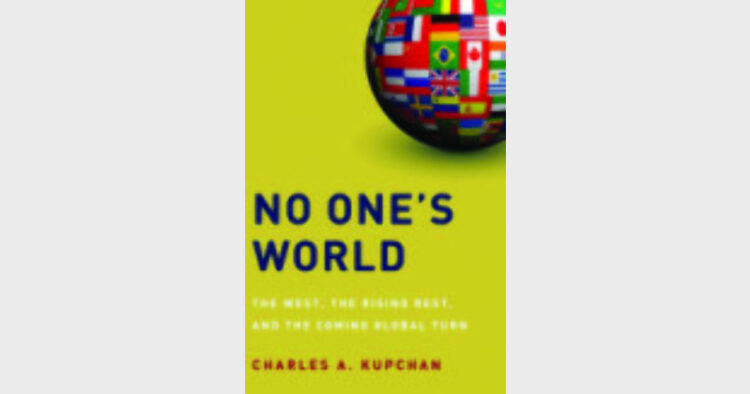Dr R Balashankar
No one’s World – The West, The Rising Rest, and the Coming Global Turn, Charles A Kupchan, Oxford University Press, Pp 258 (HB), $27.95
After dominating the world for nearly two centuries, the West is losing its grip, and at a pace it is not able to either control or even reconcile with. The natural question arising out of this scenario, who will dominate the world now? Will it be China or India, Brazil or any other power? None, says Charles A. Kupchan, in his latest book No One’s World – The West, The Rising Rest, and the Coming Global Turn. Two major developments resulted in the rise of the West, says Kupchan. The weakening of the political institutions resulted in the emergence of a class of people consisting of merchants, artisans and professional. They successfully challenged the authority of the monarchy, nobility and the church. “The relative independence of the bourgeoisie and the horizontal political and social linkages they formed undermined the ability of traditional institutions to preserve exclusively vertical lines of authority.” Secondly, the onset of reformation which was carried forward by these rising bourgeoisie weakened the power of the church and monarchy resulting the gradual withdrawal of religion from the state and the birth of political pluralism.
As the West rose, it challenged and eclipsed the existing major states. The Ottoman Empire, China, Japan and India – all powerful states became competitors. “Between 1500 and 1800, the world’s center of power moved from Asia and the Mediterranean basin to Europe and, by the end of the nineteenth century, North America. The West then used its power and purpose to anchor a globalised world—and has been at the leading edge of history ever since.”
However, the tide is turning. Countries that long operated in the shadow of Western hegemony are now entering the top ranks and expecting a level of influence commensurate with their position, says Kupchan. Converting G-8 into G-20 is an indication of this “more inclusive” world. There are people who believe that even this turn is good for the West, especially America because the world is going the “American way.” This belief is a mere day dream, says Kupchan adding that all the countries, especially the major ones are charting their own course, their own versions of democracy and governance and in fact, if one were to look at the places where America sought to establish democracy, it is the religious fundamentalists who are gaining popularity and upper hand. Iran, Algeria, the Palestine territories, Lebanon, Iraq –Islam has only strengthened its hold on politics. West Asia will never go the American way, not will the “Chinese ship of state dock in the Western harbor.”
Economically, the scene is dismal for the West. Already there has been any number of articles and books on the decline of Europe, heading for total collapse. Begging bowl is a reality for them now. Kupchan makes a striking argument when he points out that “In 2010, four out of the top five economies in the world were part of the West. In 2050, according to Goldman Sachs, the United States will be the only Western power to make it into the top five. Moreover, although the United States will be number two in 2050, its economy would be much smaller than China’s.” India will be third, Brazil fourth and Russia fifth, according to this prediction.
Militarily, though America may enjoy primacy, it would not be able to exercise its superiority freely. The United States thus appears to be following in the footsteps of Great Britain, the last global hegemon. “History never repeats itself verbatim. But its broader trends unmistakably recur…In the coming years, the rising rest will acquire new geopolitical aspirations and the military wherewithal to realise them.”
The optimistic contemporary Western thinkers believe that the world will not change much as the Western culture has seeped too deep in globally to be removed. Kupchan refutes this saying “Today’s rising powers are each following unique paths toward modernity based on their own political, demographic, topographic, and socioeconomic conditions. Accordingly, they are developing versions of modernity divergent from the West’s.” He points out that even in non-democratic and centralised states, the citizens are being given more attention than ever before, nullifying the chances of the West playing the saviour role. On the other hand the West has much to learn from the other rising powers. “All too often, American politics is about catering to narrow segments of the electorate in order to stay in office, not about pursuing policies that are in the interests of the nation as a whole… Meanwhile, the EU is pulling apart as individual member states pursue their own interests rather than those of the collective union.”
Having said all this, Kupchan feels that America would continue to be, among all Western nations, a strong voice in shaping the world. But it has to set its house in order to enjoy this position of pre-eminence, he adds. Profound changes are happening world over, which are challenging the traditional institutions and authority. If the West co-opts itself into the global cauldron it may still retain its relevance.
Sharp, objective and clear, Kupchan analyses the exciting world scenario in all aspects. One cannot help agree with him on his prognosis because they are based on sound arguments and deep understanding. It is a must read for all – academics, policy makers and politicians on both sides of the world. Kupchan is professor of International Affairs at Georgetown University and Whitney Shepardson Senior Fellow at the Council on Foreign Relations.
(Oxford University Press, Great Clarendon Street, Oxford OX2 6DP,)














Comments